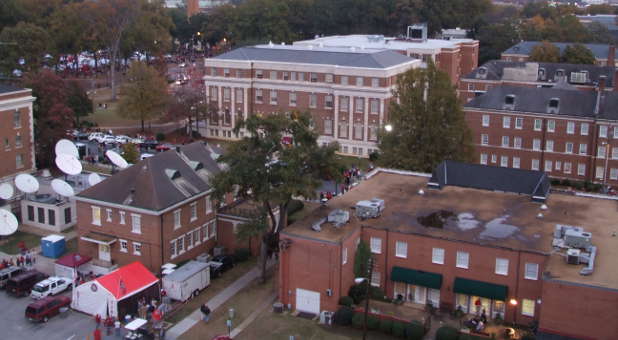ACLJ Cues Up Crucial Free Speech Case for U.S. Supreme Court
Today, the ACLJ filed a reply in support of our request that the Supreme Court hear an important free speech case, Keister v. Bell. At stake in the case is the freedom of people to speak on sidewalks along public streets.
I wrote about this case when we filed our petition in early July. Since then, attorneys representing the University of Alabama (UA) filed their own brief opposing our petition. Our reply, filed today, responds to UA’s objections.
Recall that this case involves Mr. Rodney Keister, a traveling Christian evangelist who went to the Tuscaloosa, Alabama, for gospel outreach on the sidewalks running along public streets that run, in part, along the UA campus properties. UA police told Mr. Keister that unless he had a permit from UA, he had to stop preaching and handing out leaflets. As one UA official put it, “expressive activity” on those sidewalks requires UA’s permission.
Mr. Keister sued in federal court but lost in the trial-level and appeals courts. UA’s attorneys made the surprising argument that the sidewalks along public streets that run through UA, unlike virtually every other public sidewalk in the country, are not traditional public for a—i.e., places where people generally retain their free speech rights. Even more startling, the lower federal courts agreed with UA.
That’s when we stepped in, at the invitation of Mr. Keister and his counsel, to bring this case to the Supreme Court’s attention. We urged the Supreme Court to review this important free speech case because of the constitutional—and practical—importance of the question and the unprincipled, uncertainty-generating nature of the lower court’s ruling that sidewalks are not presumptively public fora for speech.
UA, having won in the lower courts, naturally argues that there’s nothing to see here, and that the Supreme Court should pass this case by. We strongly disagree. As we state at the opening of our reply:
The public sidewalks at issue here are not part of some “special enclave” immune from the First Amendment. Contrary to respondents’ assertions, the petition presents an important question of First Amendment law: whether a public sidewalk loses its presumptive status as a traditional public forum merely because it borders public university properties. This Court should grant review.
We continue:
UA defends the negation of the public forum sidewalks here as no big deal. But UA’s brief in opposition illustrates exactly why review is necessary: the decision below enables government bodies to argue, with a straight face, that public sidewalks are not presumptively traditional public fora, and that instead every stretch of sidewalk is up for grabs.
Importantly:
Petitioner Keister is not challenging UA’s ability to manage the use of “its campus and facilities,” …—buildings, internal walkways, courtyards, etc.—but rather its attempt to assert a veto power over sidewalks adjacent to public streets.
Moreover:
University of Alabama’s pursuit of its educational mission … does not require the suppression of peaceful leafletting and exhortations on a public sidewalk adjacent to campus property.
The Supreme Court will likely schedule our petition for consideration at its end-of-summer “long conference.” We could hear as early as the end of September, or early October, whether the court agrees to review this case.
We hope the Supreme Court chooses to step in and to reaffirm its long-standing commitment to the openness of public sidewalks for free speech. That principle is important not just to street preachers but to pro-life sidewalk counselors and to the free speech rights of every American. {eoa}
For the original article, visit aclj.org.











